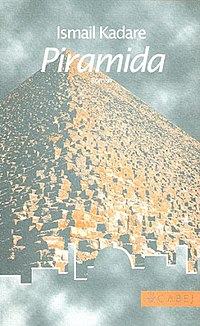The Pyramid (Kadare novel): Difference between revisions
Epicurus B. (talk | contribs) No edit summary |
m r2.7.1) (Robot: Adding ru:Пирамида (Кадаре) |
||
| Line 57: | Line 57: | ||
[[es:La Pirámide (novela)]] |
[[es:La Pirámide (novela)]] |
||
[[pl:Piramida (powieść)]] |
[[pl:Piramida (powieść)]] |
||
[[ru:Пирамида (Кадаре)]] |
|||
[[sq:Piramida (roman)]] |
[[sq:Piramida (roman)]] |
||
Revision as of 04:35, 1 November 2012
This article possibly contains original research. (January 2012) |
 | |
| Author | Ismail Kadare |
|---|---|
| Translator | Joseph Vrioni & David Bellos |
| Language | Albanian |
| Genre | Novel, Fiction |
| Publisher | Arcade Publishing (USA) & Harvill Press (UK) |
Publication date | 1 February 1996 |
| Publication place | Albania |
| Media type | Print (Hardback & Paperback) |
| Pages | 224 p. (hardback edition) |
| ISBN | ISBN 1-55970-314-8 (US hardback edition) & ISBN 1-86046-123-9 (UK hardback edition) Parameter error in {{ISBNT}}: invalid character |
| OCLC | 32429764 |
| 891/.9913 20 | |
| LC Class | PG9621.K3 P5813 1996 |
The Pyramid is a 1995 novel written by Ismail Kadare, considered one of the greatest works produced by this writer, rivaling The Garden Party, by Václav Havel. It is considered to serve both literary and a dissident purposes. [1]
Plot
Every sentence has two meanings – one in the novel and one that tells something about Communism. For example, the Pharaoh Cheops desires to build a pyramid so large that it will drain the prosperity out of Egypt, and an unprosperous people will not rebel.[2]
Reception
Like in all his novels, Kadare uses only the pure Albanian language and does not add foreign words. This is unique to him and many credit him with restoring the Albanian language. He is one of the most significant writers who has developed the Albanian language and literature. [citation needed]
"Ismail Kadare enjoys a reputation as Albania's greatest literary voice"[3]
And New York Times picked up on the significance of the "The Pyramid",
"For the pyramid, viewed by his subjects as an abiding symbol of his total and incontestable power, comes to be seen by him as a personal memento mori, a constant and paralyzing reminder that his brief life will give way to an eternal entombment in stone."[4]
See also
References
- ^ Review 04/01/1996
- ^ The Pyramid by Ismail Kadare
- ^ "Central Europe Review: The Three-Arched Bridge". 1999. Retrieved 2006-05-23.
{{cite web}}: Unknown parameter|month=ignored (help) - ^ Bawer, Bruce (1996). "Land of the Pharaoh: New York Times". The New York Times. Retrieved 2006-05-23.
{{cite news}}: Unknown parameter|month=ignored (help)
